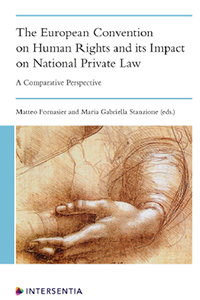
Over the last two decades, the European Convention on Human Rights (ECHR) has come to play a major role in a large number of private law issues. The aim of this book is to provide a broader view of the impact of the ECHR on national private law. To that end, it begins with a comparative analysis of the interaction between the ECHR and Contracting States’ domestic laws. The chapters forming the main part of the book explore, also from a comparative perspective, the influence of the ECHR on a wide range of fields of private law, including family law, data protection law, media law, copyright law, labour law as well as private international law and procedural law. The analysis of cases reveals many common features, but likewise some inconsistencies, in the decisions of the European Court of Human Rights (ECtHR). The final part of the book focuses on a number of overarching issues, in particular the role of comparative law in the reasoning of the ECtHR and the contribution of the ECHR to the European harmonisation of private law. What becomes apparent from the various chapters is that the ECHR and the case-law of the ECtHR are becoming important elements of a common European private law.
With contributions by Edoardo Ales (University of Naples ‘Parthenope’), Francesca Benatti (Catholic University of Sacred Heart, Milan), Gabriele Buchholtz (University of Hamburg), Katharina de la Durantaye (Free University Berlin), Konrad Duden (Leipzig University), Anatol Dutta (Ludwig Maximilian University of Munich), Dominik Ebel (Heidelberg University), Andreas Engel (Heidelberg University), Matteo Fornasier (Ruhr University Bochum), Christian Heinze (Heidelberg University), Giovanni Maria Riccio (University of Salerno), Giacomo Rojas Elgueta (Roma Tre University), Maria Gabriella Stanzione (University of Salerno), Laura Vagni (University of Macerata), Filippo Viglione (University of Padova) and Denise Wiedemann (Max Planck Institute for Comparative and International Private Law).
